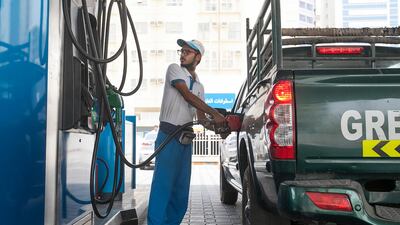Petrol prices are set to fall across the UAE in August despite sustained high global oil prices.
Motorists have faced significant rises at the pumps in recent months, including a 16 per cent increase in April, a 13 per cent rise in June and an 11 per cent jump in July.
The breakdown price per litre for August is as follows:
• Super 98: Dh4.03 — falling from Dh4.63 in July (a fall of 13 per cent)
• Special 95: Dh3.92 — decreasing from Dh4.52 in July (a fall of 13 per cent)
• Diesel: Dh4.14 — reducing from Dh4.76 in July (a fall of 13 per cent)
• E-plus 91: Dh3.84 — falling from Dh4.44 in July (a fall of 13.5 per cent)
The prices announced by the UAE Fuel Price Committee in July were the highest so far since they were liberalised in 2015, to allow them to move in line with the market.
In 2020, prices were frozen by the Fuel Price Committee after the onset of the coronavirus pandemic. The controls were removed in March 2021 to reflect the movement of the market.
The rise in fuel prices in the UAE has led to some drivers seeking alternative modes of transport.
About 52 per cent of UAE residents are considering a switch to hybrid or electric vehicles, a survey by Audi Abu Dhabi found in May.
While global oil prices have given up most of the gains recorded after Russia’s invasion of Ukraine in late February, Brent, the global benchmark for two thirds of the world's oil, is still up more than 35 per cent this year.
Brent settled 2.1 per cent higher at $103.97 a barrel at the close on Friday. West Texas Intermediate, the gauge that tracks US crude, ended up 2.3 per cent at $98.62 a barrel.
The next meeting of the Organisation of the Petroleum Exporting Countries (Opec) and allies led by Russia, together called Opec+, takes place on Wednesday, August 3.
Producers have now unwound the record 9.7 million barrels per day supply cut they agreed to in April 2020, when the Covid-19 pandemic hit demand.
The super group of oil producers agreed to stick to its output plan of adding 648,000 bpd of crude to the market in August as supply remains tight.
This comes amid mounting fears of a global recession and geopolitical tension that could dent demand.
________________________











